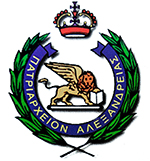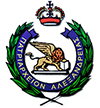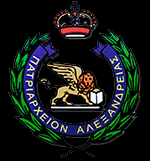Alexandria: A city inextricably linked to the Great General Alexander, a city that to this day reveals its cosmopolitan character in every alley, but also the city whose connection with the term Library is engraved in the collective memory.
The intellectual movement that took place in the Alexandrian library is indelible for science and humanity in general, with the deep incision it makes in the tradition of the texts of classical antiquity, and despite the destruction that the library suffered in 48 BC, its work continued with Christianity, where the second destruction followed with the conquest of Egypt by the Arabs in the 7th century, but again “the spirit shall not be quenched”.
Alexandria produces great Fathers of the Church, scholastic theologians and leaders of sects. They are the worthy counterweight to the old and famous Library. Origen with his voluminous written work, Clement with his vast erudition, Athanasius the Great with his supreme theological training.
The first testimonies for the new Patriarchal Library of Alexandria are found in the early 9th century AD with the restoration of the Orthodox Patriarchs and the work of Patriarch Christopher “Admonition Profitable for the Soul” during Arab rule. Also, the Coptic Patriarch John IV in 892 reports that he found information about Saint Minas in Greek books in the Library of the Church of Alexandria. Later, Patriarch Eutychius (933-940) wrote amidst the strife and persecution to which they were subjected. It is certain that despite all the oppression and isolation of the Church of Alexandria until the 12th century AD, many ancient books are written in a type of capital script called Alexandrian by paleographers, the remains of which, along with an entire codex, have survived to this day.
The oldest and most specific information about the existence of the Patriarchal Library in Alexandria are two notes by Patriarch Athanasius (1276-1326) in manuscripts no. 12 and 34 of the current Library, which contain sermons by Saint John Chrysostom and date back to the 10th century AD. According to them, the books were donated to Patriarch Athanasius in Constantinople and he himself hastened to send them to Alexandria so that they would become inseparable and inalienable property of the Library. From this time onward, we often encounter on the margins of many manuscripts insurance notes stating that these books belong to the Patriarchal Library, written in the handwriting of the Patriarchs themselves, such as Gregory (1342), Philotheos (1435- 1459), Gregory (1459-1486), and Joachim (1487-1567), who is also a codecographer (codex writer).
During the Patriarchatal tenure of Sylvester (1569-1590), the Church of Alexandria spread spiritually to the rest of the Orthodox world, resulting in a continuous series of great learned patriarchs and clergy whose actions left their mark on modern ecclesiastical history. Among them, for their rich writings but also the enrichment of the Library included are Maximus the Peloponnesian and the Patriarchs Meletius Pigas, Cyril Loukaris, Metrophanes Kritopoulos, Gerasimus Palladass, Cosmas the Benevolent, Gerasimus Gemaris, Parthenius II and Theophilus II. In the inventory compiled by Parthenios II in 1796, the Patriarchal Library then located in Cairo numbers 287 manuscripts and 1877 printed books. The same Patriarch was forced in 1804 to place all the books in a crypt to save them from looting before leaving Cairo. During the Patriarchate of Photios in 1905, the Library was in danger of being gutted by fire. During the Patriarchate of Meletios Metaxakis in 1928, on his initiative the Library was housed in the Patriarchate and he assigned Th. Volidis a study for its reorganization and modernization, which was again endangered during the Second World War. From 1930 to 1942, N. Filippidis became the official Librarian, while his contemporary Theodoros Moschonas, as Patriarchal Librarian during the Patriarchaal tenure of Christophorus, promoted it internationally, both by participating in conferences and with his catalog that informs us about the manuscripts, codices and printed publications of the Patriarchal Library, as well as in his article about the movements it underwent over the centuries. Let us not forget the brilliant celebration of its millennium in 1952 with the presence of great spiritual men.
Today, during the Patriarchal Tenure of Theodoros II of Crete, the Patriarchal Library of the Ancient Patriarchate of Alexandria is housed in the Patriarchal Mansion in a fully renovated space on the ground floor and the first floor that was completed at the expense of the National Bank of Greece due to the love for the Second throned Patriarchate of Alexandria of its Governor, Mr. Takis Arapoglou. The first floor also houses the Ecclesiastical Museum. The purpose and goal of the Primate of the Patriarchate of Alexandria and All Africa, embracing the vision of his predecessors and the employees of the Library, is to preserve and offer this spiritual treasure to the international academic community and, understanding the needs of the new era, we proceed with the classification, cataloguing, conservation and digitization of the rich material of manuscripts and printed materials, guided by the words of our Pope and Patriarch during the inauguration of the Patriarchal Mansion: “What we do for ourselves, dies with us. What we do for others and the world, remains immortal”.
†Arch. Andrew Dimitriou.
Bibliography
• Agamemnon Tselikas, Topics in Greek Paleography, 2nd Edition, Arethas
Institute: Mediterranean Research Institute for Paleography, Bibliology and History of
Texts, Athens 2008.
• George Mylonas, The Patriarchal Library of Alexandria, Patriarchate of
Alexandria 2016.
• Theodoros Moschonas, Catalogues of the Patriarchal Library, 3 Volumes,
Alexandria 1945, 1946, 1947.
• Panagiotis Tzoumerkas, The Patriarchate of Alexandria, Chelandion, Athens
2007
• Pantainos, The Millennium of the Patriarchal Library, Volume 52.
Director of the Patriarchal Library : Arch. Andrew Dimitriou
Adress: Patriarchate of Alexandria, Patriarchal Library
P.O.Box 2006, Alexandria – Egypt
Tel: +2 0155 557 8448, +2 03 48 68 595
e-mail: alex.patr.library@gmail.com.


